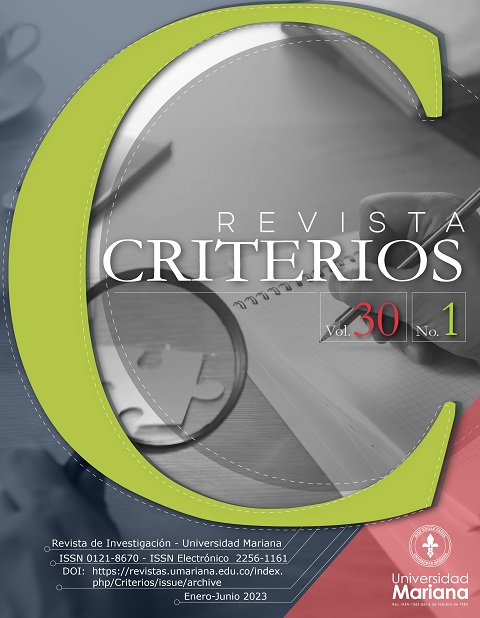The game: a didactic strategy to strengthen the reading process
DOI:
https://doi.org/10.31948/rev.criterios/30.1-art4Keywords:
strategy, reading, game, strengthening, didactic, processAbstract
The reading process is multiple since within it complex thinking skills underlie and, through this process, we can have a more critical and reflective look at the world around us. It is also clear that it is necessary to seek strategies that contribute to strengthening the reading process in students. In this article, the game is addressed in different reading situations, and how it can be established as a very important didactic strategy to strengthen the process. In addition, the article gives an account of how various authors have significantly investigated playfulness and its incidence in reading processes. The results showed an improvement in this process of the students, in terms of the literal comprehension of texts at different levels. It was concluded that the playful activities managed to capture their interest and improve concentration when reading or interpreting questions related to the texts.
Author Biographies
Maira Esther Arrieta Mier, Institución Educativa Eduardo Suárez Orcasita, Valledupar, Cesar
Master in Pedagogy. Teacher at Eduardo Suárez Orcasita Educational Institution, Valledupar, Cesar, Colombia
Juana Judith Mieles Palacín, Institución Educativa Virgen del Carmen, La Mesa, Valledupar, Cesar
Master in Pedagogy. Teacher at Vírgen del Carmen Educational Institution, La Mesa, Valledupar, Cesar, Colombia.
Gustavo Adolfo González Roys, Universidad Popular del Cesar
Master in Research and Development Management. Teacher at Universidad Popular del Cesar, Valledupar, Cesar, Colombia
References
Aquino, F. & Sánchez, I. (1999). Some reflections on play and creativity from a constructivist point of view. Tiempo de Educar, 1(2),131-153.
Baquero, M. A. (2018). Didactic design to potentiate reading comprehension through dramatic play in grade 4-1 of the Rafael Valle Meza Educational Institution, Mixta 3, Valledupar Cesar [Master’s Thesis, Universidad Santo Tomás]. https://repository.usta.edu.co/bitstream/handle/11634/16415/2018mariabaquero.pdf?sequence=1&isAllowed=
Barberousse-Alfonso, P. & Vargas-Dengo, M. C. (2017). Encouraging reading and writing at the Escuela Finca Guararí: a recreational-creative experience from the project ‘Building an implementation proposal’ of the Community Teachers Program. Revista Electrónica Educare, 23(2), 128-142. https://doi.org/10.15359/ree.23-2.7
Bonilla-Castro, E. y Rodríguez, P. (2005). Beyond the Dilemma of Methods: Social Science Research (3rd ed.). Universidad de Los Andes y Grupo Editorial Norma.
Bucheli, F., Cabrera, N., & Moncayo, A. (2015). The game as a strategy to improve reading skills in sixth-grade students at the Municipal Educational Institution INEM - Pasto [Undergraduate Thesis, Universidad de Nariño]. http://sired.udenar.edu.co/1386/
Castañeda, E. & Rosado, J. A. (2016). Development of reading activity based on ludic experiences [Specialization Thesis, Fundación Universitaria Los Libertadores]. https://repository.libertadores.edu.co/handle/11371/829
Colmenares, A. M. (2012). Participatory action research: an integrative methodology of knowledge and action. Voces y Silencios, Revista Latinoamericana de Educación, 3(1), 102-115. https://doi.org/10.18175/vys3.1.2012.0
Guerrero, J. A. (2019). What are learning strategies? Definition, types, and examples. https://docentesaldia.com/2019/12/15/que-son-las-estrategias-de-aprendizaje-definicion-tipos-y-ejemplos
Guba, E. G. & Lincoln, Y. S. (2002). Competing paradigms in qualitative research. In Denman, C. and Haro, J. A. (Comp.), Around the corners. Anthology of Qualitative Methods in Social Research (pp. 113-145). Editorial El Colegio de Sonora.
Hernández, R., Fernández, C., & Baptista, P. (2014). Research Methodology (6th ed.). McGraw-Hill / Interamericana Editores, S.A. de C.V.
Latorre, A. (2005). Action research. Knowing and changing educational practice (3rd ed.). Editorial Graó, de IRIF, S.L.
Leyva-Garzón, A. M. (2011). The game as a didactic strategy in early childhood education [Undergraduate Thesis, Pontificia Universidad Javeriana]. https://repository.javeriana.edu.co/handle/10554/6693
Minerva-Torres, C. (2002). The game: an important strategy. Educere, 6(19), 289-296.
Minerva-Torres, C. (2007). Games as a learning strategy in the classroom. http://www.saber.ula.ve/bitstream/handle/123456789/16668/juego_aprendizaje. DE78B6D58EFA42A?sequence=1
Moreno, J. A., Ayala, R., Díaz, J. C., & Vásquez, C. A. (2010). Reading practices: comprehension and assessment. Trends, status, and projections. Forma y Función, 23(1), 145-175.
Santiesteban, E. & Velázquez, K. M. (2012). Reading comprehension from a didactic-cognitive point of view. Did@scalia, Didáctica y Educación, 3(1), 103-110.
Solé, I. (1998). Reading strategies (8th ed.). Editorial Graó.
Strauss, A. & Corbin, J. (2002). Basis of qualitative research. Techniques and procedures to develop grounded theory. Editorial Universidad de Antioquia.
Valencia, C. P. & Osorio, D. A. (2011). Strategies to promote the taste and habit of reading in the first cycle [Undergraduate Thesis, Universidad Libre]. https://repository.unilibre.edu.co/bitstream/handle/10901/6039/TESIS%20IMPRIMIR.pdf
How to Cite
Downloads
Downloads
Published
Issue
Section
License

This work is licensed under a Creative Commons Attribution 4.0 International License.
Revista Criterios es publicada por la Editorial UNIMAR de la Universidad Mariana bajo los términos de la licencia Creative Commons Reconocimiento 4.0 Internacional (CC BY 4.0)

| Article metrics | |
|---|---|
| Abstract views | |
| Galley vies | |
| PDF Views | |
| HTML views | |
| Other views | |








